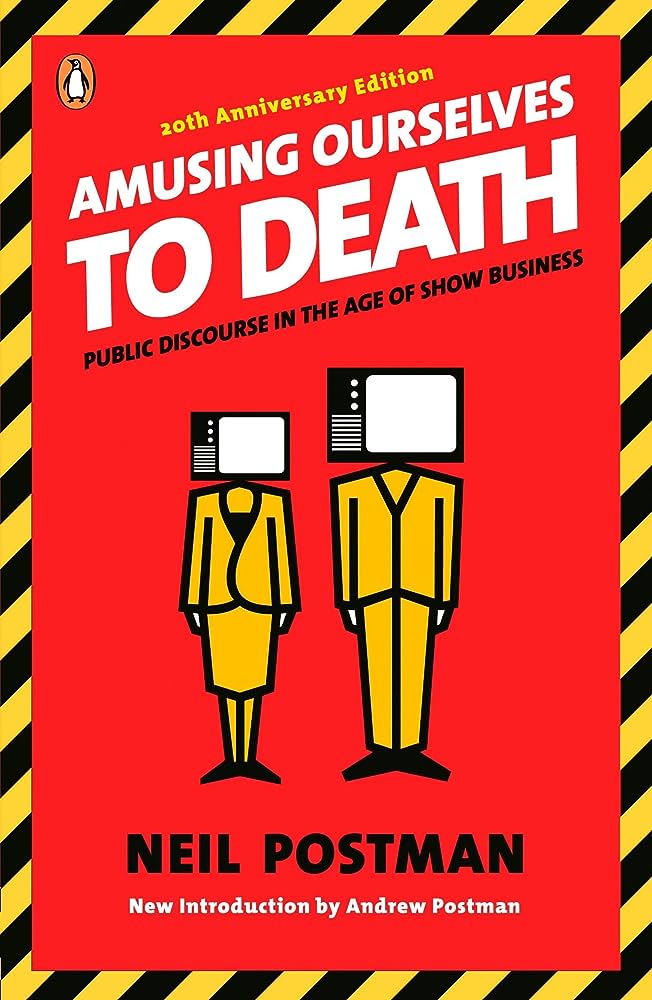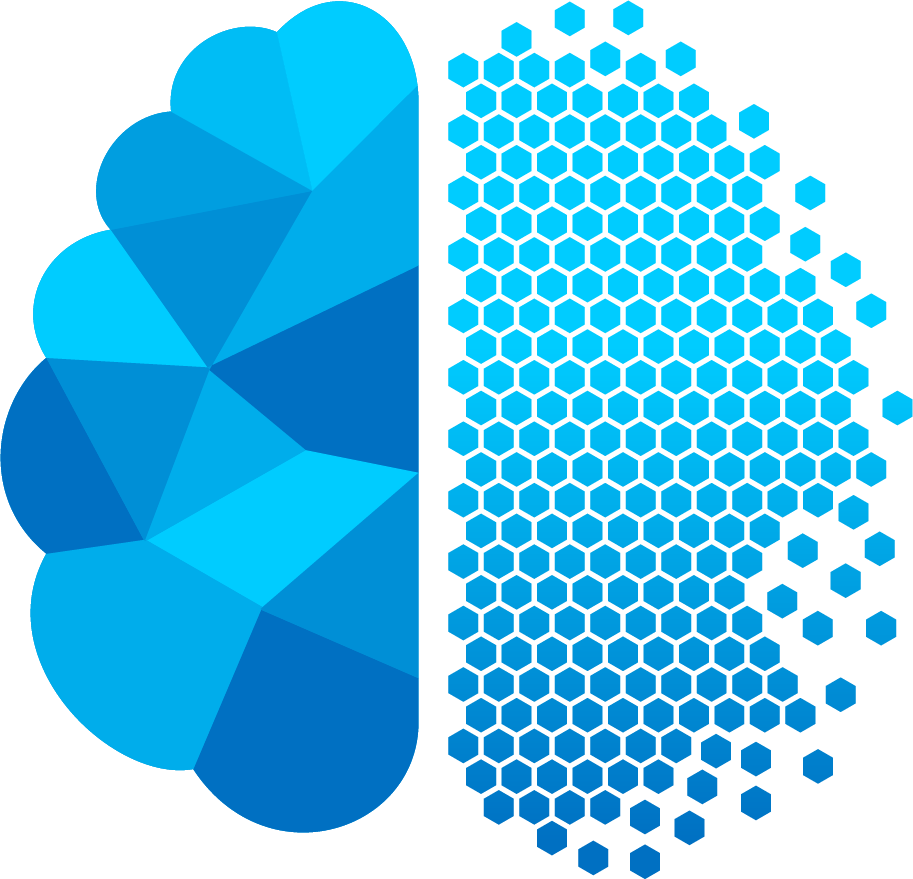We think of the Information Age as being quite recent. If you’re like me, you probably think of it as basically beginning with the Internet in the 1990s and greatly accelerating after the advent of the iPhone in 2007.
Of course we know the age of television spans the 4 decades before that, but somehow that seems different.
Well, perhaps it was different in many ways, but that age has A LOT of implications for you and me today!
This is the message of Neil Postman’s classic 1984 book Amusing Ourselves to Death, a book that has been on my radar for years, but (I’m ashamed to admit this) I only recently read.
And, “WOW!” is all I can say. I cannot recommend Amusing Ourselves to Death too highly!

Who cares if the book is 40 years old or that Neil Postman died in 2003? The guy is spot-on and puts our whole digital era into context.
And as you can see, he gives the age of television a name – “The Age of Show Business.”
I’m going to be talking about Amusing Ourselves to Death for a long time, but here are just a few things to get you started salivating and (I hope) running for your phone to order it. (That was my Neanderthal sidekick speaking. Of course I know you never need to run for your phone. I won’t let him talk again.)
Back to Amusing Ourselves to Death
The historical context that this book provides will forever change the way you think about digital technology.
Did you know that the foundations for the Information Age were actually laid in the 1840s? That’s right – two inventions of the mid-1840s were the harbingers of both the Age of Show Business and our own digital era.
(Postman describes the age preceding the Age of Show Business as the Typographic Age – the age that began with the printing press in the 15th century and reigned more or less supreme in spite of these two inventions, until the advent of television.)
What were these inventions of the mid-19th century that continue to reverberate down into our lives?
The telegraph and the photograph.
We’ll look at the telegraph today and discuss photography in the future.
Postman describes the telegraph as the totally new invention of the two. Why? Because it marked the first time that communication was divorced from human transportation. Think of that – never before had information been conveyed faster than a human being could travel! (By the way, that speed in 1840 was the heady pace of 35 mph, the speed of trains, themselves in widespread use in Britain and America for only a few decades.)
Here is what Postman writes about the telegraph: “It destroyed the prevailing definition of information, and in so doing, gave a new meaning to public discourse.”
Henry David Thoreau was one of the few people at the time to recognize what was happening, and he wrote in Walden, “We are eager to tunnel under the Atlantic and bring the Old World some weeks nearer to the New; but perchance the first news that will leak through into the broad flapping American ear is that Princess Adelaide has the whooping cough.”
(Never say those grizzled sages of the 1840s didn’t have a sense of humor. “Broad flapping ear” indeed – it’s perfect.)
Back to his point.
If you’re like me, you, at first, wonder what the problem is here. Princess Adelaide was the cousin of Queen Victoria; why wouldn’t Americans want to hear about her whooping cough?
But this only proves how conditioned we are by our world. As you keep reading, his point sinks in: What difference does her whooping cough make to anyone’s life in America?
And suddenly, the full impact of the telegraph and its descendants on our world dawns on you.
Most of the information that we are consuming, being distracted by, and wasting our time on every day, has ZERO impact on our lives.
Knowing this information makes NO difference to what you or I need to do today to fulfill our God-ordained destiny.
In many ways, this is what is wrong with all of us in a nutshell.
Too much of our lives are being wasted because we’re being inundated with information that we do not need.
The Problem With the Information Age? Lack of Context
Postman explains the problem further. The telegraph largely started the concept of “news” – information divorced from its context but suddenly packaged as essential to the knowledge of someone far away from the scene of the action.
And our world has been full of it ever since.
Here are some more quotes:
- “Telegraphy gave a form of legitimacy to the idea of context-free information.”
- “The telegraph made information into a commodity, a “thing” that could be bought and sold, irrespective of its uses or meaning.”
- “Only four years after Morse opened the first telegraph line on May 24, 1844, the Associated Press was founded and news from nowhere, addressed to no one in particular, began to crisscross the nation. Wars, crimes, flashes, fires, floods – much of it the social and political equivalent of Adelaide’s whooping cough – became the context of what people called the “news of the day.”
- “As Thoreau implied, the telegraph made relevance irrelevant.”
Let the significance of that last quote sink in.
Our Media Consumption Today
We’ll look at this topic again and dive into the additional impact of the photograph, but this week, let’s take a good hard look at our consumption of news and social media.
How much of it is information that makes an actual DIFFERENCE in how you live your life?
Oh sure, it may make you feel sadder and more stressed – headlines these days do that to me – but does it change your plans for the day or give you new tools for your job?
Very little of the news or social media I consume makes any difference to my life.
You know what the real problem is though?
We don’t even think to ask the question!
The thought of asking, “What difference does this information make for my life?” feels foreign, proving just how broad and flapping our ears have become by 2023.
Of course, I have to put in a few caveats. Trivia can be interesting and that is not necessarily wrong. And there are real benefits to knowing about significant events such as catastrophes on the other side of the world even if our daily lives aren’t affected. We can pray for the people in need, send aid, and praise God more for the blessings he has given us.
My point is simply this: If we want to retain any focus in this digital age, we must begin asking the question. And if we choose to allow ourselves to spend time on trivia simply because it’s interesting (and all of us do some of this), at least we will know what we are doing.
Asking the question will restore a measure of control to our digital consumption, and that is what we so desperately need.
What Would Implementing This Today Look Like?
This is the real question here at Digital Dayz: How can I change my life today, even in just a small way?
What would happen to my focus next week if I cut out everything that didn’t have context for my life and purpose?
Would I be amazed at the difference it would make?
Let’s try this challenge:
1. Record every day the top app or site that wasted your time while making no difference to your life (and if Facebook and news apps aren’t at the head of most of our lists, I’ll be surprised).
2. Write down what sucked you in (or, in other words, fooled you into thinking that it had context for your life) and the amount of time that you wasted on it.
3. Purpose to do better the next day. (Even if you cut out only 10 minutes every day, in a week, you will have added an hour to your week.)
4. Lastly, share your insights to help all of us out.
Let’s see what we can do to avoid the ill effects of the telegraph on our world!
Tell anyone else who might like to sign up for our weekly email and check out the Digital Dayz community online. There’s not much there yet, but we have big plans for the coming months!





Leave a Reply